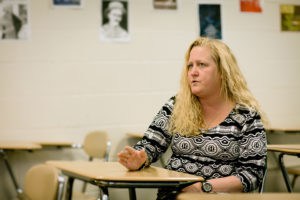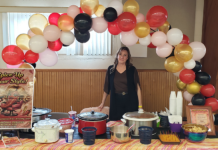
MANCHESTER – Jill Ocone is already a distinguished staff member at Manchester Township High School. Besides being a gifted English and journalism teacher who also creates the yearbook each year, and student newspaper when time allows, she organizes both the school’s Veteran’s Day recognition service of local veterans, and the Hawks Hall of Honor, the ever-expanding memorial to graduates who have served in the armed forces, with special recognition to those who died in service.
Ocone rocked BB-8 leggings when she met with The Manchester Times, and talked openly of her 37-year-and-counting crush on Boba Fett, the bounty hunter who delivered Han Solo to Jabba the Hutt. The interview did go Star Wars geek for a few moments.
But that’s Ocone, friendly, open, personable, dedicated to her students and to her profession. She’s distinguished herself yet again as one of only 655 certified journalism educators through the Journalism Education Association, a big deal when one considers there are about 3.1 million teachers in the U.S.
In NJ, high school journalism classes are often taught by English teachers, because English and journalism both have words…and that’s about where the similarities end. The certification Ocone acquired helps promote a uniform professionalism of knowledge, goals and standards for journalism teachers.
She was recognized at the February Board of Education meeting for her accomplishment, which was an accomplishment indeed: her computer crashed during the examination, forcing her to start over and rush through already-answered questions before her time expired. She really didn’t think she passed.
But, she did. And she sat down with The Manchester Times to talk about the importance of not only molding the next generation of journalists, but shaping media-savvy students.
MT: It’s certainly an interesting time to a journalist, especially on the national and international stage. How do you explain “fake news” to your students?

Ocone: It’s hard to in our society. People believe everything they see. We will start our class with talking about what’s in the news, what they hear, what they see, on social media. And they’re pretty good about questioning where these outlets got their facts from. When my students say, “They say this,” I ask, “Who is they?” I’m as guilty of it as everybody else. But once you start questioning who “they” is, then it puts a whole different perspective on where the news is coming from.
I tell them to be intelligent news consumers, not to believe everything. There are a couple news items we did fact check. Look and see, is it from something like a Huffington Post where almost anybody can post, or is it from something like The Washington Post? Even if it is from the Post, does the article have a slant? Are the writers talking about Republicans only, are they talking about Democrats only? What are they talking about positively and negatively?
MT: Can your students easily spot slants, and do they think it’s a problem for journalists to have them?
Ocone: I think it depends on the group. This group I have this year, I think, are pretty in the middle, and I don’t think they’re necessarily on one side or another, where last year I think they would have been predominantly more a Democratic slant.
MT: “Print is dying.” What is the future for these students of journalism?
Ocone: That’s a hard question. The students I do have are interested in journalism, and they have been following the news on their own. Out of my regular journalism class this year, I have two or three students who would consider it as a career. A lot of the students I’ve had have not wanted a career in journalism. They just enjoy the yearbook, enjoy the newspaper, they enjoy the experience that is in here. But I do have some students now who do want to have a career and when they’re starting to look at colleges, I said, “Make sure that you do have plan B.” Journalism changes every day, as a new app comes out, as a new form of technology comes out. The old way is obsolete.
No matter what, journalists will always have to write, whether it’s for an online audience or a print audience.

I am surprised that print has not gone away quicker. If you had asked me five years ago, I thought we would have been to the point where everything was online. But, I read that Nook wasn’t doing as well as they had anticipated.
(She lifts a piece of paper). I’m the type of person, I need to have it, I can’t do it online. But I’m also a member of the generation who was in school remembering when Ivan Drago and Rocky fought, and we were all afraid of the Russians back then because we didn’t know.
There will always been an outlet for journalists, but they have to have their own ethics and stick to their own ethics. Do the job you expect of you, not what the audience expects or the consumers might expect.
You write the facts and let people form their own opinions, not write your opinion and present it as fact that people must accept.
MT: Exactly. There are a lot of journalists who are more into it for the entertainment value. That’s what I meant: the journalists who are doing the show or the blog or the vlog, and they’re just doing it for the entertainment value versus getting it for the story out.
Ocone: I think about journalists like James Foley and Steven Sotloff who were killed by ISIS, they were out there to get the story out. That type of journalist, we’re losing that, journalists like that, who are doing it to get the stories out versus “getting likes,” getting popularity out of it.
MT: How does it affect society when journalism becomes entertainment?
Ocone: I think society feeds into it, but I also don’t think that they’re getting the whole scope of an unbiased look at whatever it is that journalist might be covering. Everybody is entertaining these days. I see it in the classroom: students will only participate only because they want to be entertained and have an audience follow them. The need to entertain rather than get the story out for the right reasons is overtaking so many things.
MT: Do you encourage your students to read from a variety of sources, watch a variety of sources?
Ocone: We use The New York Times inSCHOOL, and I don’t use that just in the journalism class, sometimes I’ll incorporate that into my English classes. We do use The New York Times but, if the student has to do a current event, I will tell them, go to NJ.com, go to a credible site, and go to something different every now and then, so they can see the different views.
MT: You are not only an educator, but you a writer, a journalist, as well. How did you get into that?
Ocone: I always wrote. Even in high school I wrote. I never believed in my writing. I never really told people I wrote.
When I went back to college after not doing too hot, I went to Mercer County College, and I had a lot of English credits. I looked at the Communications program, and I completed that program with a 4.0. While I was there, I loved it so much, I had anticipated going into TV news, but I was also older at the time and didn’t want to relocate.
Channel 6 (ABC) was awesome. I would go in there Tuesday nights and Saturdays in their news room. This was way before digital, back in ’98, right when digital started taking over. But it was still old school. I just loved everything about it. I freelanced for a newspaper out there. I also wrote some articles for my job at the time at the NJ School Boards Association, and I wrote for American Cheerleader magazine as a freelancer.
And then again, life happened. I got sidetracked. Writing in my free time and no one really knowing about it, and the gig with Jersey Shore Magazine. I picked up that magazine every time I saw it. ‘Man, I would love to write something in here.’ My friend wrote for them, and she had met the publisher through her husband, and the publisher was looking for another writer, and I wrote one article, and the next issue I wrote two articles, and now I’ve moved to four articles or so in each issue, and they’re all about Jersey shore, all about something I love.
It’s neat, because when I get the topics, I will bring them into class and workshop them. “Okay, here’s my topic. What do you guys think?” And sometimes the students have actually given me some really good ideas and avenues that I wouldn’t have even thought of. And I appreciate that, because the target reader of Jersey Shore Magazine is probably 18 to 55, visitors, so it’s nice to get the younger aspect as to what they think.






